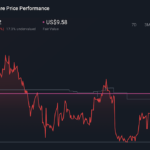
Aphria Inc. told investors Wednesday that cannabis sales jumped 65% in its most recent quarter, but pull-backs from wholesale buyers across Canada due to COVID-19 forced the company to rescind guidance for the full year.
U.S.-traded shares of Aphria APHA, +3.15% rose 3.8% in afternoon trading.
Aphria Chief Financial Officer Carl Merton yanked the company’s full-year guidance of C$575 million ($413.5 million) to C$625 million, telling investors in a conference call early Wednesday that executive were unable to “accurately forecast the company’s year-end results” due to the COVID-19 pandemic. Aphria’s fiscal year ends in May and the company had already slashed its guidance when it reported second-quarter earnings.
Several provinces such as Ontario, Alberta and British Columbia were closed to deliveries for a week at the end of March to perform year-end inventory counts, he said, and several have scaled back purchasing overall. Ontario, the country’s most populous province, cancelled two weeks of cannabis purchases due to COVID-19. Alberta is ordering 40% less pot and in British Columbia, stores are closing voluntarily as they convert to curbside pickup, Merton said.
Quebec is proving a bright spot thus far, with sales at bricks-and-mortar stores up 40% and e-commerce sales ballooning 200% since the pandemic-related restrictions went into effect, Merton said.
Read:Aurora Cannabis will roll up its shares in a reverse stock split — here’s what you need to know
The CFO said the company has halted new significant capital expenditures and slashed its marketing budget by C$4 million in the fourth quarter. Merton said the company has sufficient funds for the next 12 months, a cash balance of C$515 million and no debt maturities for the next year.
In a conference call Wednesday morning, Chief Executive Irwin Simon said Aphria had made several changes due to COVID-19, including staggering work schedules, increasing sanitation measures and re-designing work facilities to ensure social distancing. The company has not laid off any staff.
See also:As cannabis industry stays largely quiet on coronavirus, this CEO has been sounding the alarm
Despite rescinding the company’s guidance due to COVID-19, Jefferies analyst Owen Bennett wrote in a Wednesday note that investors should not detract from “what is another stellar operational quarter.”
While the company’s first quarter revenue rose to C$144.4 million ($102.8 million) from C$73.58 million, C$88.3 million of the company’s sales resulted from its acquired low-margin European drug distribution business, CC Pharma.
Aphria’s cannabis sales net of excise taxes rose 65% to C$55.6 million. Recreational cannabis sales accounted for C$44.7 million of its total pot revenue. Because of production delays at one of its facilities, Aphria bought C$30 million worth of weed from the spot market through the second and third quarter, half of which it had sold by the quarter’s end for C$20 million. CFO Merton estimated Aphria’s gross profit would have been C$7.6 million greater if it had grown the pot itself.
The company reported late Tuesday that the company had swung to net income of C$4.96 million ($3.53 million), or 2 cents a share, from a loss of C$108.27 million, or 43 cents a share, in the year-ago period. That beat the FactSet consensus for a loss per share of 4 cents. Aphria’s weed got cheaper to grow, dropping to C$6.41 ($4.56) per gram from C$8.16 the prior quarter.
Bennett wrote in the Wednesday note that Aphria is one of the few companies “posting positive sales and earnings momentum, while also having a strong liquidity position going into a period of uncertainty.” In the note Bennett wrote that Aphria has a “healthy” amount of cash and the company is entering a period of uncertainty “with clear sales and earnings momentum that they should be able to resume.”
Bennett rates Aphria a buy with a $7.50 price target.
The U.S.-listed stock has lost 30.5% over the past three months, while the Cannabis ETF THCX, -2.19% has dropped 40.3% and the S&P 500 index SPX, -2.19% has declined 13.5.
MarketWatch staff writer Tomi Kilgore contributed to this article.








